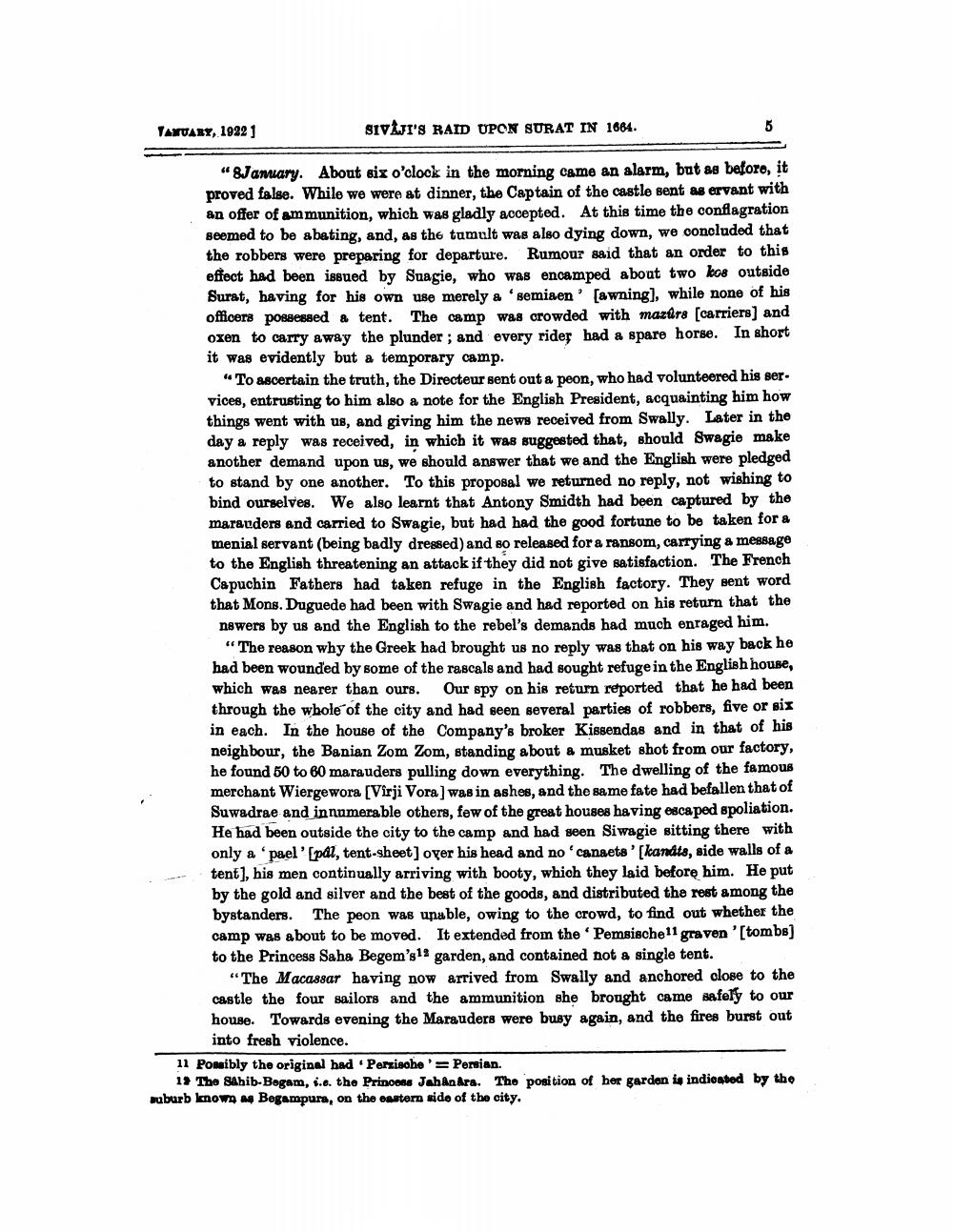Book Title: Indian Antiquary Vol 51 Author(s): Richard Carnac Temple, Devadatta Ramkrishna Bhandarkar Publisher: Swati Publications View full book textPage 9
________________ TANUARY, 1922 1 SIVAJI'S RAID UPON SURAT IN 1884. "&Jamiary. About six o'clock in the morning came an alarm, but as before, it proved false. While we were at dinner, the Captain of the castlo sent as ervant with an offer of ammunition, which was gladly accepted. At this time the conflagration seemed to be abating, and, as the tumult was also dying down, we ooncluded that the robbers were preparing for departure. Rumour said that an order to this effect had been issued by Suagie, who was encamped about two kos outside Surat, having for his own use merely a semiaen [awning), while none of his officers possessed a tent. The camp was crowded with mazúra (carriers) and oxen to carry away the plunder; and every rider had a spare horse. In short it was evidently but a temporary camp. "To ascertain the truth, the Directeur sent out a peon, who had volunteered his ser. vices, entrusting to him also a note for the English President, acquainting him how things went with us, and giving him the news received from Swally. Later in the day a reply was received, in which it was suggested that, should Swagie make another demand upon us, we should answer that we and the English were pledged to stand by one another. To this proposal we returned no reply, not wishing to bind ourselves. We also learnt that Antony Smidth had been captured by the marauders and carried to Swagie, but had had the good fortune to be taken for a menial servant (being badly dressed) and so released for a ransom, carrying a message to the English threatening an attack if they did not give satisfaction. The French Capuchin Fathers had taken refuge in the English factory. They sent word that Mons. Duguede had been with Swagie and had reported on his return that the nswers by us and the English to the rebel's demands had much enraged him, "The reason why the Greek had brought us no reply was that on his way back he had been wounded by some of the rascals and had sought refuge in the English house, which was nearer than ours. Our spy on his return reported that he had been through the whole of the city and had seen several parties of robbers, five or six in each. In the house of the Company's broker Kissendas and in that of his neighbour, the Banian Zom Zom, standing about a musket shot from our factory, he found 50 to 60 marauders pulling down everything. The dwelling of the famous merchant Wiergewora (Virji Vora) was in ashes, and the same fate had befallen that of Suwadrae and innumerable others, few of the great houses having escaped spoliation. He had been outside the city to the camp and had seen Siwagie sitting there with only a 'pael'pdl, tent-sheet) over his head and no 'canaets '[kandts, side walls of a tent], his men continually arriving with booty, which they laid before him. He put by the gold and silver and the best of the goods, and distributed the rest among the bystanders. The peon was unable, owing to the crowd, to find out whether the camp was about to be moved. It extended from the 'Pemsische 11 graven '[tombs] to the Princess Saha Begem's18 garden, and contained not a single tent. "The Macassar having now arrived from Swally and anchored close to the castle the four sailors and the ammunition she brought came safely to our house. Towards evening the Marauders were busy again, and the fires burst out into fresh violence. 11 Ponibly the original had. Perzische '= Persian. 17 The Sahib-Bogam, s.c. the Princess Jah&ndra. The position of her garden is indicated by the suburb know Begampura, on the eastern side of the city,Page Navigation
1 ... 7 8 9 10 11 12 13 14 15 16 17 18 19 20 21 22 23 24 25 26 27 28 29 30 31 32 33 34 35 36 37 38 39 40 41 42 43 44 45 46 47 48 49 50 51 52 53 54 55 56 57 58 59 60 61 62 63 64 65 66 67 68 69 70 71 72 73 74 75 76 77 78 79 80 81 82 83 84 85 86 87 88 89 90 91 92 ... 374
